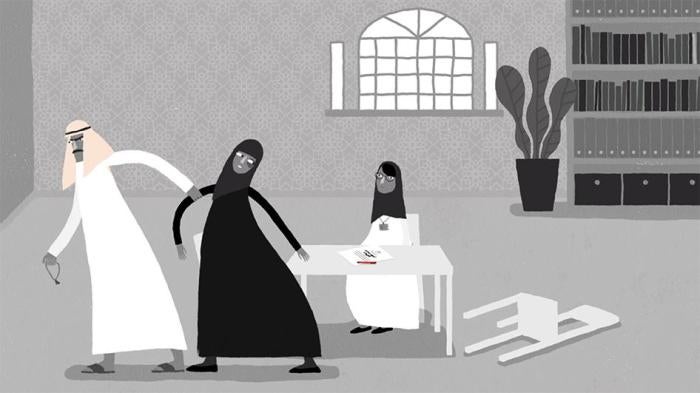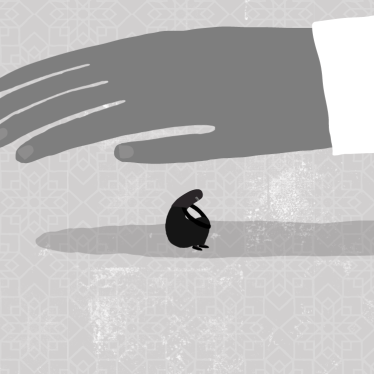(Beirut) – Rahaf Mohammed, the Saudi woman who managed to successfully flee her allegedly abusive family, has shed new light on the countless women trapped under the abusive male guardianship system in Saudi Arabia, Human Rights Watch said today. Women face systematic discrimination and are left exposed to domestic violence under the male guardianship system and have few places to turn when they face abuse, leading some women to undertake dangerous escape attempts to flee the country.
Under the male guardianship system, a man controls a Saudi woman’s life from her birth until her death. Every Saudi woman must have a male guardian, normally a father or husband, but in some cases a brother or even a son, who has the power to make a range of critical decisions on her behalf. The Saudi state essentially treats women as permanent legal minors. Saudi Arabia has done very little to end the system, which remains the most significant impediment to women’s rights in the country.
“Rahaf Mohammed’s courageous quest for freedom has exposed anew an array of discriminatory practices and policies that disempower Saudi women and leave them vulnerable to abuse,” said Michael Page, deputy Middle East director at Human Rights Watch. “Saudi Crown Prince Muhammad bin Salman wants to be viewed as a women’s rights reformer, but Rahaf showed just how laughably at odds this is from reality when the authorities try to hunt down fleeing women and tortures women’s rights activists in prison.”
While other countries in the Middle East have elements of the male guardianship system, Saudi Arabia’s is the by far the most draconian in the extent of its laws and regulations, as well as the authorities’ efforts to apply them. Human Rights Watch has documented the impact of such laws and policies on the lives of women in its 2016 report, “Boxed In: Women and Saudi Arabia’s Male Guardianship System.” Below are 10 reasons why Saudi women flee their country.
10 Reasons Why Saudi Women Flee
- No Freedom to Travel or Get a Passport
No country restricts the movement of its female population more than Saudi Arabia. Women cannot apply for a passport or travel outside the country without their male guardian’s approval, restrictions the Interior Ministry imposes and enforces. In practice, some women are prevented from leaving their homes without their guardian’s permission and guardians can seek a court order for a woman to return to the family home. Saudi Arabia did not allow women to drive cars until June 2018. The travel restrictions make it very difficult for Saudi women to flee the country. Many resort to hacking into their male guardian’s phone to change their travel permission settings or run away from family members while outside the country.
- No Freedom to Choose Marriage Partner, and Child Marriages
Saudi authorities limit a woman’s ability to enter freely into marriage by requiring her to obtain the permission of a male guardian. A woman’s consent is generally given orally before a religious official officiating for the marriage, and both the woman and her male guardian are required to sign the marriage contract. Whereas men can marry up to four wives at a time.
Saudi law has no minimum marriage age, and Saudi media outlets continue to carry occasional reports of child marriages, including rare reports of girls as young as 8. On January 9, 2019, Saudi Arabia’s Shura Council, an advisory body, overwhelmingly passed a proposal setting the minimum age of marriage at 18, but leaving exceptions for girls ages 15 to 18 to marry with court approval. The proposal will become law only if promulgated by Saudi Arabia’s council of ministers.
- Domestic Violence
As in other countries, many women in Saudi Arabia are subject to domestic violence. Over a one-year period ending October 13, 2015, the Ministry of Labor and Social Development reported that it encountered 8,016 cases of physical and psychological abuse, most involving violence between spouses. Saudi Arabia criminalized domestic violence in 2013, but activists have criticized the lack of implementation of the law.
Saudi Arabia’s National Family Protection Program estimates that 35 percent of Saudi women have experienced violence, yet the head of Saudi Arabia’s Human Rights Commission said that of the 1,059 cases referred to Saudi courts in 2017 involving violence against women, only 59 were for domestic violence. Guardianship makes it incredibly difficult for victims to seek protection or obtain legal redress. Human Rights Watch research has found that women occasionally struggle to report an incident to the police or access social services or the courts without a male relative.
Moreover, the male guardianship system facilitates domestic violence by granting male relatives a huge amount of control over women’s lives. Controlling a woman’s movements itself is a form of domestic violence that the government enforces.
Women who attempt to flee an abusive spouse or family can be arrested and returned to their families. If they flee or are referred to shelters, they are not allowed to leave unless they reconcile with family members or accept an arranged marriage. The shelters and the authorities do not facilitate women’s ability to live independently.
- Employment Discrimination
Saudi Arabia has increased employment opportunities for women in recent years in areas previously closed to them. The Saudi government does not enforce formal guardianship restrictions on women wishing to work, but the authorities do not penalize private or public employers who require a guardian’s consent for women to work or restrict jobs to men. In addition, some professions, like judges and drivers, remain off limits to women, and strict sex segregation policies act as a disincentive to employers considering hiring women.
- Healthcare Discrimination
A 2014 medical code of ethics prepared by a state institution declares that a woman’s consent should be sufficient to receive health care. In reality, however, the requirement for guardian permission is dependent on a particular hospital’s internal regulations, and the government does not penalize institutions that require consent. Human Rights Watch spoke with medical professionals at private hospitals that do not require guardian permission and others at public hospitals that require guardian permission for a woman to be operated on or admitted. Human Rights Watch has documented how requiring guardian approval for medical procedures has exposed women to prolonged pain or, in extreme cases, to life-threatening danger.
- Inequality in Divorce, Child Custody, Inheritance
Like many other Muslim-majority countries, Saudi Arabia bases its personal law system on Islamic law. But unlike most other countries, Saudi Arabia has no written family law.
Women’s right to divorce is more restricted than for men. Men may unilaterally divorce their wives without condition. The man does not need to inform his wife that he intends to divorce her, nor must she be in court for her husband to obtain a divorce decree.
The authorities introduced a notification system in January that allows for women to be notified by text when a man registers his divorce in the courts. But woman’s rights activists report that men often unilaterally divorce women orally without documentation, leaving the woman to prove to the courts that their husbands have divorced them.
Women have no right to unilateral divorce and are subject to lengthier and more costly processes. Women either must seek a khul’ divorce, under which a man generally agrees to the divorce on the condition that a woman will pay back the full amount of her dowry, or a woman can apply to the courts for a fault-based divorce on limited grounds, and must prove the fault, such as mistreatment by the husband. As there is no personal status or family law, the judge determines whether there was mistreatment. Throughout divorce proceedings, a woman’s husband remains her guardian, with the authority to control her decisions.
While the courts may allow children to live with their mothers following a divorce, women have no right to be their children’s legal guardian. An activist who follows the issue said that girls usually are transferred to the father’s custody at age 7 and that boys may decide at age 9 which parent they want to live with.
In 2014, the authorities issued a positive ruling that when children are ordered to live with their mothers after divorce, she can obtain documents and conduct government business for them. The decision enabled women to register their children in schools, take them to health centers, and obtain identity documents for them. Fathers, however, maintain the right to grant travel permission for children or to authorize daughters’ marriages.
In matters of inheritance, as in most Muslim-majority countries, women are only entitled to inherit half of what male heirs inherit.
- Challenges to Transferring Guardianship
In certain cases women may transfer legal guardianship from one male relative to another, but it is an extremely difficult legal process. Human Rights Watch research indicates that it is very difficult to transfer guardianship except for cases in which a woman can prove severe abuse or that the guardian is incapable of caring for her, for example due to old age. Even then, it can only be done through a court order and can be difficult to establish the requisite level of proof.
- Restrictions on Leaving Prison and Shelters
Saudi prisons and juvenile detention centers only allow women to exit into the care of a male relative. Imprisoned women whose families refuse to release them are forced to remain in prison or in shelters until they reconcile with their families or obtain a new guardian, occasionally only after arranged marriages.
- Restrictions on Studying Abroad
Unlike Saudi men, women cannot study abroad on a government scholarship without guardian approval and, while it is not always enforced, the rules officially require a male relative to accompany them throughout their studies abroad.
- Political Repression
Under Crown Prince Mohammad bin Salman, Saudi authorities have intensified a coordinated crackdown on dissidents, human rights activists, and independent clerics. In 2018, this repression extended to the country’s leading women’s rights advocates who have advocated ending the male guardianship system. On May 15, just weeks before the Saudi authorities lifted the ban on women driving on June 24, authorities began arrests of prominent women’s rights activists and accused several of them of grave crimes like treason that appear to be directly related to their activism.
By November, at least 10 women remain detained without charge, though some anticipated charges could carry prison terms of up to 20 years. Human rights organizations began reporting in November that Saudi interrogators tortured at least four of the women, including by administering electric shocks, whipping the women on their thighs, and sexually harassing and assaulting them.









